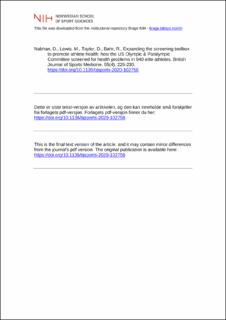| dc.contributor.author | Nabhan, Dustin | |
| dc.contributor.author | Lewis, Melie | |
| dc.contributor.author | Taylor, David | |
| dc.contributor.author | Bahr, Roald | |
| dc.date.accessioned | 2021-02-09T14:33:32Z | |
| dc.date.available | 2021-02-09T14:33:32Z | |
| dc.date.created | 2020-12-08T07:58:58Z | |
| dc.date.issued | 2020 | |
| dc.identifier.citation | British Journal of Sports Medicine. 2020, 55(4), 226-230. | en_US |
| dc.identifier.issn | 0306-3674 | |
| dc.identifier.uri | https://hdl.handle.net/11250/2726980 | |
| dc.description | I Brage finner du siste tekst-versjon av artikkelen, og den kan inneholde ubetydelige forskjeller fra forlagets pdf-versjon. Forlagets pdf-versjon finner du på bjsm.bmj.com / In Brage you'll find the final text version of the article, and it may contain insignificant differences from the journal's pdf version. The definitive version is available at bjsm.bmj.com | en_US |
| dc.description.abstract | Aim: To assess the value of including validated screening tools for allergies, anxiety, depression, sleep apnoea and sleep quality into an electronic patient health history questionnaire. Methods: In this descriptive study, we reviewed electronic medical records of Olympic and Paralympic athletes who completed health screenings, which included validated screens for allergies (Allergy Questionnaire for Athletes), anxiety (General Anxiety Disorder-2), depression (Patient Health Questionaire-2), sleep apnoea (Berlin Questionnaire) and sleep quality (Pittsburgh Sleep Quality Index), using established criteria for a positive screen. We report the prevalence of positive tests and the associations between positive screening tools. Results: A total of 683 Olympic and 257 Paralympic athletes (462 male, 478 female) completed the health history between May and September of 2019. At least one positive screen was reported by 37% of athletes training for the Olympics and 48% of athletes training for the Paralympics. More than 20% of all athletes screened positive for allergies and poor sleep quality. Athletes training for the Paralympics had a significantly higher percentage of positive screens for anxiety, depression, poor sleep quality and sleep apnoea risk. Females had significantly more positive screens for allergy and poor sleep quality. Conclusions: The addition of standardised screening tools to an electronic health history resulted in the identification of potential mental health, sleep and allergy problems in both Olympic and Paralympic athletes. Strong associations between mental health and sleep disorders suggest these problems should be considered together in health screening programmes. | en_US |
| dc.language.iso | eng | en_US |
| dc.subject | epidemiology | en_US |
| dc.subject | health promotion | en_US |
| dc.subject | injury prevention | en_US |
| dc.subject | olympics | en_US |
| dc.title | Expanding the screening toolbox to promote athlete health: how the US Olympic & Paralympic Committee screened for health problems in 940 elite athletes | en_US |
| dc.type | Peer reviewed | en_US |
| dc.type | Journal article | en_US |
| dc.description.version | acceptedVersion | en_US |
| dc.source.pagenumber | 6 | en_US |
| dc.source.journal | British Journal of Sports Medicine | en_US |
| dc.identifier.doi | 10.1136/bjsports-2020-102756 | |
| dc.identifier.cristin | 1857237 | |
| dc.description.localcode | Institutt for idrettsmedisinske fag / Department of Sports Medicine | en_US |
| cristin.ispublished | true | |
| cristin.fulltext | postprint | |
| cristin.qualitycode | 2 | |
